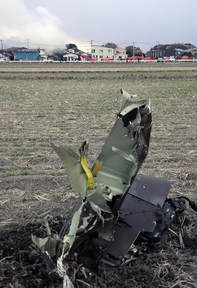 Source: 毎日新聞
Source: 毎日新聞 This incident, which raised barely a murmur here in Australia, stands in stark contrast to recent events in Okinawa, where in late December 2017 part of a CH-53E Super Stallion fell off the helicopter in flight over the city of Ginowan and landed in the grounds of a kindergarten. This was the latest in a series of mishaps involving US (primarily Marine) military equipment over Japan, and served to heighten the fears of city residents about the mechanical state of US Marine Corps aircraft traversing over the city. Protests were lodged by the Okinawan prefectural government with both the federal government in Tokyo and the local US Marine Corps command, who (eventually) apologized for the incident and promised to ensure that there would be no repeat of it (I say eventually as the Marine Corps originally denied that the part fell off one of their helicopters in flight, only to confirm a few days later that it did in fact fall off a Marine Super Stallion).
Then late last month the Japanese government took the extraordinary step of appointing some of its own Ground Self Defence Force inspectors to Marine Corps bases in Okinawa in order to check the airworthiness of Marine equipment, specifically the AH-1Z Viper and UH-1Y Venom helicopters. According to Defence Minister Onodera, “The Ministry of Defense will promptly confirm and verify the state of inspections and maintenance conducted by the U.S. side utilizing the Self-Defense Forces’ professional and technical knowledge.”
It was not without a sense of irony, then, when news came on Tuesday morning of the crash of a GSDF AH-64 Apache helicopter into a residential area of the city of Kanzaki in Saga prefecture. In a press interview given later in the day, Defence Minister Onodera confirmed that the main rotor head on the helicopter had recently been changed during maintenance, thereby indicating that this may have been the cause of the accident. During Diet budget deliberations, PM Abe also issued an apology to city residents on behalf of the government, promising that everything would be done to prevent a similar incident from occurring.
This serves as a reminder that no matter how confident one might be in one’s technical prowess, accidents and mishaps are an inevitable part of base operations, and that goes double for the Marine Corps given the high tempo of activity in the western Pacific. The powers that be might want to take this into consideration when voicing criticisms of Marine Corps, and might express some degree of sympathy for the aviators whose professionalism and sacrifice have prevented any greater disaster from occurring.
 RSS Feed
RSS Feed